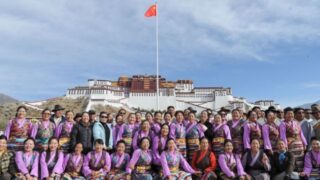A statement by the Inter-Parliamentary Alliance on China (IPAC) builds upon Dr. Adrian Zenz’s new findings to denounce atrocities and Western immobilism.
by Marco Respinti


As German independent scholar Dr. Adrian Zenz concludes in his new research, the CCP is running a system of forced labor camps in Tibet on the same successful model of the ill-famed transformation trough education camps of Xinjiang, that its inhabitants prefer to call East Turkestan. There, according to the most recent statistics, up to three million Uyghurs and thousands from other Turkic minorities are detained in horrible conditions, for the sole reason of being Muslim believers and resisting “sinicization.” Dr. Zenz is the first scholar who has detailed the reality of the Xinjiang camps and has calculated the number of their inmates, at the time of his first studies, one million people. It is worth noting that, following his solid studies, Dr. Zenz has been as viciously as falsely attacked by the CCP propaganda machine, which accused him to be a “religious fanatic” paid by the US and an “extremist.”
The “military-style” (军旅式, junlüshi) project in Tibet, which includes enforced indoctrination and intrusive surveillance (although not necessarily detention, a difference with Xinjiang), raises serious human rights concerns, and has prompted the Inter-Parliamentary Alliance on China (IPAC) to release, on September 22, 2020, the very day of the publication of Dr. Zenz’s study, a statement so far signed by 63 lawmakers representing many countries of the world. IPAC is an international cross-party group of legislators working towards reform on how democratic countries approach China. It released a statement promising political action in each of the 18 countries represented by IPAC. “This report”, writes IPAC, “is the latest in a mounting body of evidence documenting egregious human rights abuses in Tibet, where the situation surrounding religious freedom, systemic political persecution and forced cultural assimilation of the indigenous Tibetan people has been deteriorating for decades.”
The phrase “vocational training” is used in Tibet by the CCP to justify its harsh repressive policy as it is in Xinjiang and, once more similarly to Xinjiang, the aim is the reform of the supposed “backward thinking” of Tibetans and their uplifting from “traditional laziness”. This language betrays a project of “cultural genocide” ‒ which is one of the central topics of Dr. Zenz’s studies on China ‒, which makes the struggle for cultural liberty in Xinjiang, Tibet and Inner Mongolia, which local Mongolians prefer to call Southern Mongolia, one and the same cause.
To address this, IPAC’s statement calls specifically for targeted “Magnitsky-style” sanctions upon those responsible, and for governments to revise risk advice to businesses currently sourcing from Tibet and other affected areas, to prevent the use of forced labor in supply chains. The reference is to the “Global Magnitsky Human Rights Accountability Act”, a 2017 piece of legislation that makes possible for the United States to sanction foreign individuals responsible for atrocities. In fact, the US Department of State has already sanctioned four top CCP officials in Xinjiang, including Chen Quanguo, the present Xinjiang Uyghur Autonomous Region Communist Party Secretary and the former Communist Party Secretary of Tibet Autonomous Region, i.e. the person responsible for the twin campaigns of repression in both regions. And restrictive measures have been taken by the US State Department also against CCP officials guilty of violations of religious liberty and human rights in Tibet.
Of all countries represented in the IPAC, Italy will host a press conference in the House of Representatives in Rome on October 1. Organized by parliamentarians critical of the Italian government’s acquiescence to the Chinese policies within the framework of the “Belt and Road Initiative,” it will denounce the decades-old repression of basic human rights in Tibet, Xinjiang, Inner Mongolia, and Hong Kong. At the same time, a pacific demonstration organized by the Tibetan Community in Italy will be held in Milan, the “business capital” of the country.









